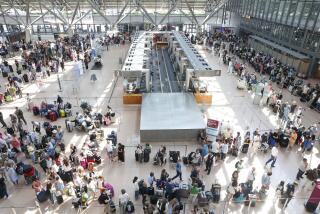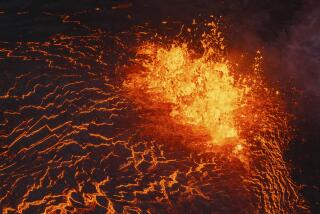Volcanic pall over Europe shows no signs of disappearing
- Share via
Reporting from London — The miasma of volcanic ash hovering over Europe showed no sign of dissipating Saturday, keeping thousands of forlorn travelers stranded across the continent for a third day and worsening economic losses.
The cloud of grit from the still-erupting Eyjafjallajokull volcano in Iceland began creeping as far south as Italy, forcing authorities to shut down airports in the northern part of that country.
Travelers anchored to Earth continued their scramble for hotels, or for trains, ferries and even taxis to reach their destinations. In Copenhagen, an enterprising cab company posted fares for long hauls across the continent: about $2,000 for passengers going to Amsterdam, $6,000 all the way to Madrid.
Most of British airspace remained closed, with planes grounded until 1 p.m. Sunday at the earliest despite a brief window of opportunity for a few flights Saturday afternoon from airports in Scotland, Northern Ireland and northern England. By Saturday evening, the volcanic pall covered the whole country once again.
In Germany and northern France, including Paris, authorities canceled all flights until early Sunday. Irish, Belgian, Dutch, Austrian and Swiss airspace was restricted. Most major airports throughout Scandinavia were idled, including Arlanda, Stockholm’s largest, which warned on its website: “The forecast is now even more uncertain than before.”
With the pileup of marooned passengers growing by the hour, and with U.S. airlines canceling more than 80% of their flights to Europe on Saturday, analysts say that clearing out the backlog and getting the system back to normal could take days once the ash cloud dissipates.
And no one was predicting when that would happen.
“It’s still erupting,” Armann Hoskuldsson, a scientist at the University of Iceland, said of the volcano.
“It’s more or less constant.”
As winds blew the volcanic debris farther south and east, previously unaffected countries in central and eastern Europe, stretching as far as Ukraine, also began reporting a halt to air traffic.
The disruptions threw into further doubt the plans of many world leaders to attend Sunday’s state funeral for Polish President Lech Kaczynski in Krakow. On Saturday, President Obama canceled his plans to pay his respects to the leader, who was killed in a plane crash a week ago.
“I spoke with acting President [Bronislaw]Komorowski, and told him that I regret that I will not be able to make it to Poland due to the volcanic ash that is disrupting air travel over Europe,” Obama said in a statement issued by the White House.
Other guests, including high-level delegations from Spain and South Korea, had already sent their regrets.
Trade and tourism losses mounted for a region already struggling to get out from under the thumb of the global recession.
Perishable foodstuffs marked for export sat untouched in warehouses, while roses and other fresh flowers from as far away as Africa and Asia were in danger of wilting and dying before reaching European markets.
Here in Britain, there were reports of shortages of a few items on supermarket shelves, including certain fruits. The country imports much of its fruits and vegetables, the bulk of which arrives by sea but a portion of which is flown in.
The airline industry alone stands to lose more than $200 million a day, the International Air Transport Assn. said. The Europe-wide aviation agency Eurocontrol said it expected only 5,000 flights across European airspace Saturday, compared with 22,000 normally.
The volcano’s eruptions were “fairly stable” Saturday, in contrast to its irregular activity Friday, scientist Hoskuldsson said. Ash and tiny particles of glass were being spewed up to three miles in the air.
A team of volcanologists from the University of Iceland had hoped to fly over Eyjafjallajokull on Saturday to glean more information on how much longer the volcano might continue ejecting ash, but the expedition had to be called off, the Associated Press reported.
In Britain, balmy blue skies over much of the country gave no hint of the layer of grit high in the atmosphere. But some residents as far south as the county of Buckinghamshire, just north of London, woke to find a fine gray coating of ash on their windows.
Times staff writer Mark Silva in Washington contributed to this report.
More to Read
Sign up for Essential California
The most important California stories and recommendations in your inbox every morning.
You may occasionally receive promotional content from the Los Angeles Times.











